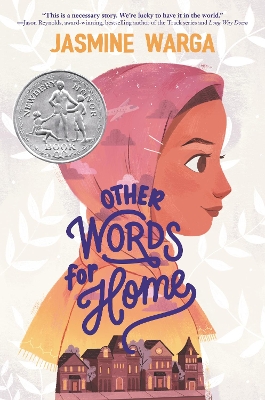Reviewed by nannah on
I’ve come to really enjoy young adult books written in free verse. It’s amazing to see someone say something as moving and poignant in three or four lines of text as I would usually see in three or four pages. And Other Words for Home is definitely one of those novels with that kind of power. A great read to start off 2021!
Content warnings:
- racism & Islamophobia (in-book only)
Representation:
- Jude and her family are Syrian (and then Syrian American) and Muslim.
- She also has a friend who is Jordanian American and Muslim.
- Jude is also in a class with three minor characters who become her friends. They are immigrants like her from Korea, China, and Somalia.
- One of Jude's classmates, Miles, seems to be neurodivergent (can't give you any confirmation on this, but it's one neurodivergent person recognizing another here).
When her town in Syria starts to become violent, Jude and her mom move to America to live with her uncle, leaving her brother and father behind. In the United States, everything has a label: Jude is now “Middle Eastern”; her food is now “Middle Eastern food”, she’s now “other”, and she soon sees a new, awful label on her friend’s restaurant: “terrorist”. But the US also has the possibility of new friends and a new family and new experiences she’d always dreamed of trying out back home. Little by little, Jude starts to learn that both her homes, Syria and the US, can be equally as important to her and places she can belong.
Other Words for Home is incredibly sweet and earnest. It does a great job taking on the voice of a child who has to move to the United States and feel “lucky” for it. It’s a recurring theme throughout the book, and the lines about it are always placed at the ends of chapters because they’re so impactful. They really did make me sit there a while before I was able to turn the page:
”It is so strange to feel lucky / for something that is making my heart feel so sad.”
[...]
“Lucky, I whisper to myself that night. / I wonder if I say it enough times, / if it will start to feel true, / come true.
There is an Arabic proverb that says: / Her luck splits open rocks. / I am still waiting to feel like the force / and less like the rocks.”
While this book does tackle things like Islamophobia, prejudice, “white feminism” (the kind that has white Christian women running up to Muslim women trying to convince them they’re in America now and don’t have to wear hijabs or other head coverings anymore, etc.), and other types of oppression, the main bulk of the book is about family and belonging.
I’m already mentally making a list of people and teachers to recommend this to. It’s a really good read, and it kept me up till probably three o’clock a couple nights.
But it’s not faultless, of course. While I loved our protagonist, Jude, I felt she was too perfect a child most of the time. She was faultless, and I wish she had maybe a hard time adjusting to at least one little aspect of life in the US or had a major argument or something that lasted more than a single short chapter. It was always everyone around her that was more selfish, more short-tempered, more rude. I know this is middle grade fiction, and she’s a character kids can look up to, but it would be nice and satisfying to be able to see her grow as a character as well.
There was also a bit of cissexism when the ultrasound doctor asks if Jude’s mom would like to know if the mom’s baby is a boy or a girl. The doctor says she thinks she knows but would like to take one more look because “It’s important to be certain about these things”. It’s an unnecessary line that made me uneasy for the sole reason that this book is very succinct and chooses its words carefully.
Those are definitely not reasons to avoid this book, though. It’s really very good, and it’s one of those works you know will make a big difference in someone’s life. Brilliant writing and a lovely, important, and necessary story.
Reading updates
- Started reading
- 28 January, 2021: Finished reading
- 28 January, 2021: Reviewed
